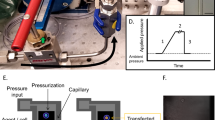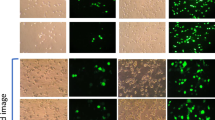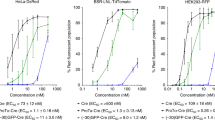Abstract
Lipofection involves the introduction of foreign genetic information into mammalian cells through the use of lipophilic reagents that enhance cellular uptake of polynucleotides. Despite the use of currently optimized lipofection conditions, including the use of serum-depleted media, the efficiency of gene transfer is often low. We show here that, in a variety of cell lines, polybrene markedly enhances the efficiency of lipofection under standardized conditions and also compensates the serum-mediated inhibition of lipofection. Although the degree of the polybrene effect depends on the nature of the cell line, these results indicate that individually optimized concentrations of polybrene can be useful for increasing the efficiency of lipofectin-mediated gene transfer in vitro.
This is a preview of subscription content, access via your institution
Access options
Subscribe to this journal
Receive 12 print issues and online access
$259.00 per year
only $21.58 per issue
Buy this article
- Purchase on Springer Link
- Instant access to full article PDF
Prices may be subject to local taxes which are calculated during checkout
Similar content being viewed by others
Author information
Authors and Affiliations
Rights and permissions
About this article
Cite this article
Abe, A., Miyanohara, A. & Friedmann, T. Polybrene increases the efficiency of gene transfer by lipofection. Gene Ther 5, 708–711 (1998). https://doi.org/10.1038/sj.gt.3300652
Received:
Accepted:
Published:
Issue Date:
DOI: https://doi.org/10.1038/sj.gt.3300652
Keywords
This article is cited by
-
CRISPRi gene modulation and all-optical electrophysiology in post-differentiated human iPSC-cardiomyocytes
Communications Biology (2023)
-
Production and Use of Gesicles for Nucleic Acid Delivery
Molecular Biotechnology (2022)
-
Timing and duration of lipofection-mediated CRISPR/Cas9 delivery into porcine zygotes affect gene-editing events
BMC Research Notes (2021)
-
Long-Term Engraftment and Angiogenic Properties of Lentivirally Transduced Adipose Tissue-Derived Stromal Cells
Molecular Biotechnology (2013)
-
Design and construction of targeted AAVP vectors for mammalian cell transduction
Nature Protocols (2007)



